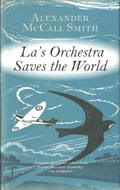La's Orchestra Saves the World is the first Book I've read by Alexander McCall Smith. He's not an author I've ever considered reading before, but the description of this one and
this review convinced me to give this one a go. And it was only a short book, but definitely worth reading.
La (short for Lavender) is an intelligent, educated woman in the 1930's who meets Richard whilst at University in Cambridge. They marry shortly after graduation, and all is well for a few years. then he deserts her, runs off to France with a French woman, and La moves to Suffolk to live in a house given to her by her parents in law.
That is all covered in the first chapter though, so that is not really the point of the story. She moves to Suffolk on the verge of the outbreak of WWII, and the story really takes off from there, as we see La adjust to country life, and realise the differences between life in a city and life in a village. She misses music and literature, and more importantly, people that she can talk about these things to. The shadow of Richard is always there though, with La trying to keep herself busy in a place where there is not really much to do, to stop herself thinking about him, and how much she misses him. This becomes inconsequential though as war breaks out and she throws herself into war work on a local farm, and later on a project to start up an amateur orchestra as a morale booster.
Through her contact with the local army barracks, who are instrumental in the setting up of the orchestra, La meets and becomes attached to a Feliks, a Polish man, and her attachment to him is central to the story. In the end, she betrays him, although she believes she is doing it for the right reasons, and he is cleared, her relationship with him is severed at this point, until much later in her life.
Partly, this is a simple wartime story about people pulling together, and the psyche of a nation when war strikes. There are no bombs or fighting though. That is all mentioned, but is distant, and it is a portrayal of how life goes on, especially in a small, isolated village. War is there, and is looked on with disdain, especially by La, but her little world continues, albeit with some small adjustments. La is at a distance from the war, and until she speaks to her friend in London she doesn't even realise this herself. But her disgust for war is evident throughout the book. It's a book about ordinary people, and how they feel and react to events decided by politicians and armies is vitally important in times of crisis
"They knew that a rash decision,a moment of reckless anger in the mind of a powerful man, could bring the world to an end. It was almost impossible to absorb that knowledge, yet people had done so. But that was not really why La had called the concert. She had called it because she believed in the power of music. Absurdly, irrationally, she believed music could make a difference to the temper of the world."
But ultimately, this story is about one woman's struggle to find a place in a changing world. La was happy and had gradually fallen in love with her husband, and when he left, she didn't know where she fitted in. She built herself a small world to live in, but her university education left her believing it was ever quite enough, or it shouldn't be. La was the best thing about this book. I found myself constantly wondering what decisions I would have made in her situation, and even if I think I would have made different ones, I could sympathise with her, and all the other characters in the story. They were all so well drawn, and seemed so realistic. I was rooting for La all the way, and really wanted it to all work out. I won't ruin it and say whether it did or not!
As to whether I would read any more by this author, I don't know. The Ladies Detective Agency series doesn't appeal at all, but I will look into the others and possibly try one of those. I did really enjoy this though.











